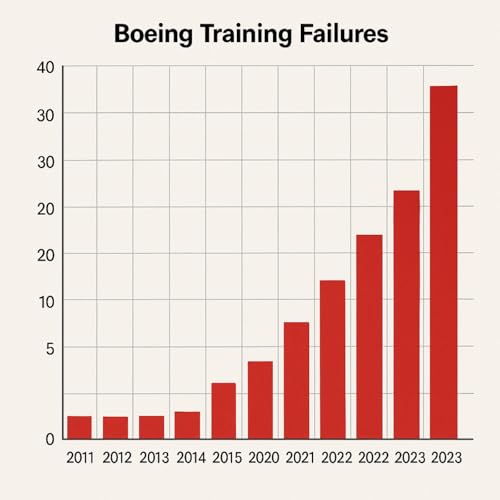
When you say training you don't mean Boeing..right?🤔
カートのアイテムが多すぎます
カートに追加できませんでした。
ウィッシュリストに追加できませんでした。
ほしい物リストの削除に失敗しました。
ポッドキャストのフォローに失敗しました
ポッドキャストのフォロー解除に失敗しました
-
ナレーター:
-
著者:
このコンテンツについて
Briefing Document: NTSB Investigation into Boeing's Door Plug Blowout
Date: July 15, 2025
Source: "Boeing’s inadequate training and oversight led to doorplug blowout: NTSB | Manufacturing Dive"
I. Executive Summary:
The National Transportation Safety Board (NTSB) has concluded its investigation into the January 5, 2024, Alaska Airlines mid-exit door plug blowout, attributing the incident primarily to Boeing's failure to provide "adequate training, guidance and oversight" to its factory workers. The NTSB's final report, released July 10, 2025, also criticizes the Federal Aviation Administration (FAA) for ineffective compliance enforcement and oversight of Boeing's safety management system. The incident revealed critical lapses in quality control, documentation, and safety culture within Boeing, despite previous commitments to improve.
II. Key Findings and Themes:
A. Boeing's Systemic Failures:
Inadequate Training and Oversight: The core finding is that Boeing did not adequately train, guide, or oversee its factory workers, directly leading to the door plug blowout.
Missing Bolts and Improper Reinstallation: The NTSB's initial investigation found "four key bolts were missing from the Boeing 737-9." These bolts, crucial for securing the door, were removed during repairs at Boeing's Renton, Washington, factory and "seemingly not replaced."
Lack of Documentation and Process Adherence: Employees who removed the door plug "did not generate a removal record," a violation of Boeing’s business process instruction for parts removals. The door plug was then "closed without securing the bolts and attachment hardware and a quality assurance inspection was not performed."
Unresolved Safety Management System (SMS) Issues: Despite initiating an SMS in 2016 as part of a settlement and modifying it after two fatal 737 Max crashes (Lion Air 2018, Ethiopian Airlines 2019), the NTSB found "many issues were still unresolved."
Absent Specialized Personnel: None of the technicians "who specialized in opening or closing the plugs were working at the time the plane was at the Renton factory" when the work was performed.
Prior Nonconformity Not Fully Addressed: Spirit AeroSystems workers noted a "minor nonconformity in the seal flushness of the door plug" prior to shipping the fuselage to Boeing, though they determined no re-work was needed as it was structurally sound. This highlights a potential area where further scrutiny might have been warranted down the line.
B. FAA's Insufficient Oversight:
Lack of Enforcement Compliance: The NTSB directly "called out the Federal Aviation Administration for a lack of enforcement compliance and oversight of Boeing’s voluntary safety management system program, which did not identify and mitigate risks."
Preventable Deficiencies: NTSB Chairwoman Jennifer Homendy stated, "The safety deficiencies that led to this accident should have been evident to Boeing and to the FAA — should have been preventable... But the same safety deficiencies that led to this accident could just as easily have led to other manufacturing quality escapes and, perhaps, other accidents.”
C. Broader Implications and Consequences:
Ongoing Legal Battles: Boeing, along with Spirit AeroSystems, faces "multiple lawsuits from passengers on the flight for physical and psychological trauma."
Reopened DOJ Case: The incident "reopened a Department of Justice case over two crashes that killed 346 people," which Boeing had initially resolved in 2021. Boeing is currently awaiting a judge's decision on a new plea deal that could involve paying $1.1 billion to avoid criminal charges.



